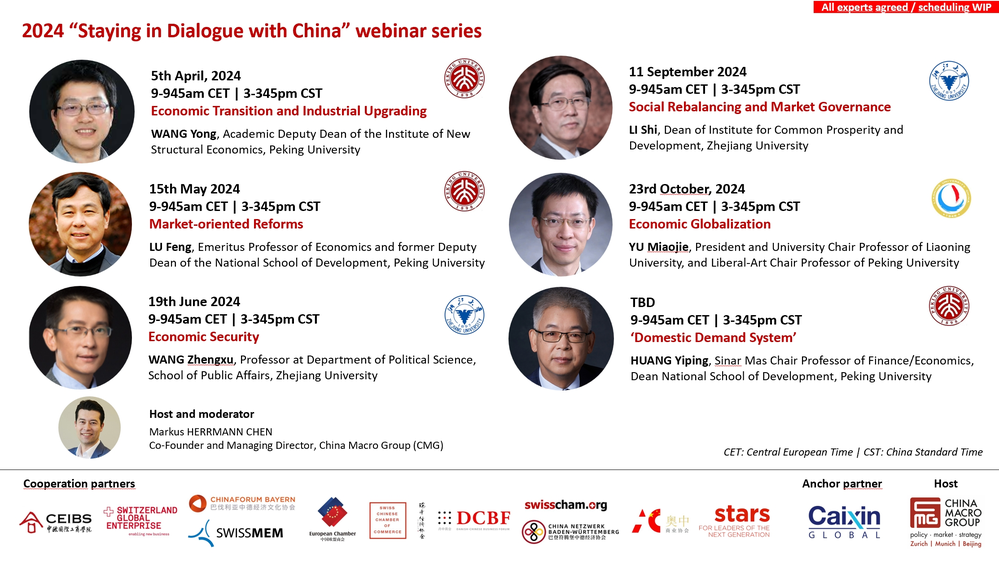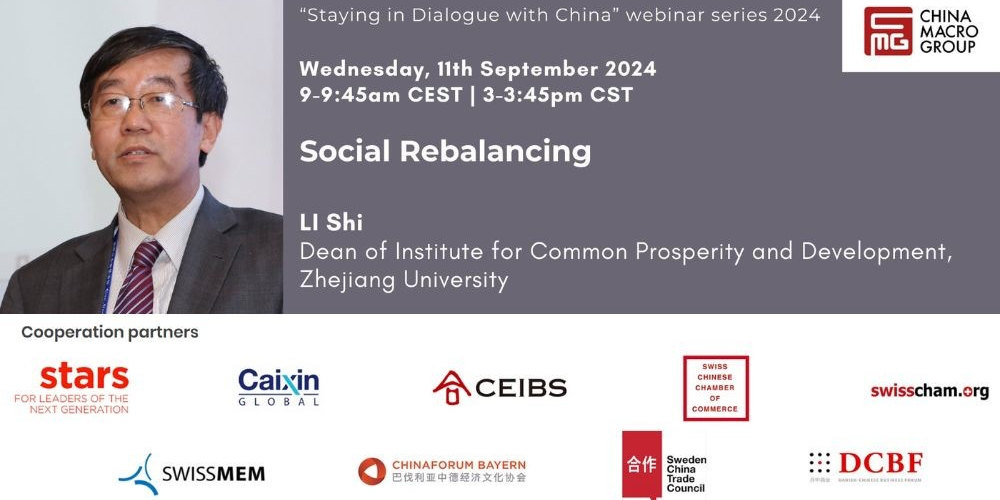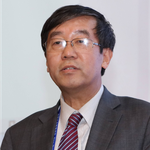Registration
Please click HERE to register.
Please contact melissa.liu@swisscham.org, if you encounter problems with registration or have questions.
Event Details
Dear Members and Friends of SwissCham,
SwissCham Beijing is delighted to invite you to our supported "Staying in Dialogue with China" webinar series - Social Rebalancing, which will take place on September 11 at 3pm.
In our fourth webinar of this year's "Staying in Dialogue with China" series, we look forward to talking to Prof. LI Shi, Dean of the Institute for Common Prosperity and Development, Zhejiang University, about China's "social rebalancing" as a fourth structural transition as per CMG's conceptual framework of China's political economy (cf. CMG).
Institutional reforms kick-started in 1978 enabled China's rapid catch-up. These reforms, however, were applied selectively and thus the development has been heavily skewed towards China's coastal areas. So, despite officially having eradicated absolute poverty in 2021, the Gini coefficient for the country's income distribution still stands at 0.467 (2022), much higher than the 0.35 average in Asia.
In 2020, the late Premier Li Keqiang reminded everybody that China still has 600 million people living on a monthly income of 1,000 yuan (US$140), "barely enough to cover monthly rent in a mid-sized Chinese city". President Xi likewise conceded that "unbalanced and inadequate development remains a pronounced problem". Problems are thus manifold: domestic household consumption remains structurally subdued, migrant workers still don't enjoy the same public services as regular urban residents do, and birth rates have been falling rapidly – also due to higher costs of living.
Coming out of the Third Plenum, the mid-year July Politburo meeting as well as the Beidaihe leadership conclave, what are Beijing's – possibly readjusted – policy priorities and recipes to address these social policy challenges? How has "Common Prosperity" already become a policy reality? What are first learnings from its pilot in Zhejiang province? How will China's lower-class workers be protected, allowed to unionize and taxed in the future? How can social rebalancing contribute to long-term goals such as stimulating consumption and reviving birth rates?
This webinar will be moderated by Markus Herrmann Chen, Co-Founder and Managing Director of CMG. Take the opportunity to listen in and ask your questions to Prof. LI.
This webinar will not be recorded, but a transcript will be published following the webinar.
*******
中国瑞士商会诚挚邀请您参加我们支持的"与中国保持对话"系列网络研讨会之社会再平衡,该活动将于9月11日下午3点举行。
在今年"与中国保持对话"系列的第四次网络研讨会中,我们期待与浙江大学共同富裕与发展研究院院长李实教授探讨中国的"社会再平衡",这一主题被CMG的中国政治经济学概念框架视为第四次结构性转型。
1978年启动的体制改革推动了中国的快速追赶发展。然而,这些改革是选择性实施的,因此发展严重偏向中国沿海地区。尽管中国在2021年正式宣布消除绝对贫困,但国家收入分配的基尼系数在2022年仍为0.467,远高于亚洲平均水平的0.35。
2020年,已故的李克强总理提醒大家,中国仍有6亿人口月收入仅为1000元人民币(约140美元),"勉强够支付中等城市的月租"。习近平主席也承认,"发展不平衡不充分问题仍然突出"。因此,问题多种多样:国内家庭消费结构性低迷,农民工仍然无法享受与普通城市居民相同的公共服务,出生率也因生活成本上升而迅速下降。
在三中全会、年中七月的政治局会议以及北戴河领导层会议后,北京可能会调整哪些政策重点和解决这些社会政策挑战的方案?"共同富裕"已经如何成为政策现实?浙江省的试点有哪些初步经验?未来中国的基层工人将如何受到保护,如何被允许组织工会和征税?社会再平衡如何有助于促进消费和恢复出生率等长期目标?
本次网络研讨会将由China Macro Group联合创始人兼董事总经理Markus Herrmann Chen主持。抓住机会,倾听并向李教授提问。
本次网络研讨会不会录制,但会在会后发布文字记录。
With best regards,
Your SwissCham Team
Online Zoom
Webinar Series
After 45 years of exceptional development and growth, structural complexities in China's political economy are becoming increasingly challenging, calling for policymakers to skillfully navigate China's economy towards the proclaimed 'High-Quality-Development'. To make sense of these complexities and potential policy conundrums that shape the strategic context for foreign business, CMG looks at China's political economy and evolving policy environment by way of six structural transitions – three longer-term transitions that China embarked on with the 'reform and opening up' (改革开放) period, and three more recent transitions involving policy-steered trade-offs and rebalancing.
In this 2024 "Staying in Dialogue with China" webinar series, CMG will explore, debate and refine this conceptualization to these six structural transitions featuring six distinguished Chinese economists as expert speakers. Click here to find out more about the entire series.

Tickets
- Ticket
- Complimentary













